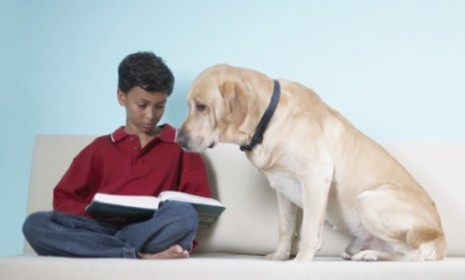Can dogs teach kids to read?
New anecdotal evidence suggests that kids who practice reading to dogs become more adept than kids who read to humans

A free daily email with the biggest news stories of the day – and the best features from TheWeek.com
You are now subscribed
Your newsletter sign-up was successful
Is there anything dogs can't do? From helping witnesses give courtroom testimony to grieving impressively for long-lost owners, our canine companions are intimately involved in many aspects of our lives — including childhood education. Researchers at Tufts University recently completed a study that suggested dogs can help children improve their reading skills. Here, a brief guide to this research:
How was this study conducted?
Over the span of five summer weeks, 18 second-graders were divided into two groups; one group read aloud to another person for 30 minutes once a week, and the other group read aloud to a dog. The canines chosen to participate were from a local Reading Education Assistance Dogs (R.E.A.D.) Program, which pairs therapy dogs with children.
The Week
Escape your echo chamber. Get the facts behind the news, plus analysis from multiple perspectives.

Sign up for The Week's Free Newsletters
From our morning news briefing to a weekly Good News Newsletter, get the best of The Week delivered directly to your inbox.
From our morning news briefing to a weekly Good News Newsletter, get the best of The Week delivered directly to your inbox.
What did the researchers find?
Some surprising differences between the two groups emerged. The children who read to a dog saw a slight increase in their words-per-minute reading rate, whereas the children who read to a human experienced a slight decrease. Additionally, one-third of the children who read to a human failed to complete the five-week program, while none of the children paired with pooches dropped out.
But wait — this study is too small to be meaningful, right?
Right. While the study is anecdotally interesting, the sample size isn't nearly large or random enough to be considered statistically significant.
A free daily email with the biggest news stories of the day – and the best features from TheWeek.com
Did the dogs derive any benefit?
None have taken up reading, but they seemed to enjoy the program. "My dog, when she recognizes the building that the reading program is in, she gets very excited," says Tufts professor Lisa Freeman, as quoted in the Boston Globe. "That’s important — having everybody happy on both sides of the leash is going to be very important."
Sources: Boston Globe, EurekAlert, UPI
-
 Properties of the week: pretty thatched cottages
Properties of the week: pretty thatched cottagesThe Week Recommends Featuring homes in West Sussex, Dorset and Suffolk
-
 The week’s best photos
The week’s best photosIn Pictures An explosive meal, a carnival of joy, and more
-
 The ‘ravenous’ demand for Cornish minerals
The ‘ravenous’ demand for Cornish mineralsUnder the Radar Growing need for critical minerals to power tech has intensified ‘appetite’ for lithium, which could be a ‘huge boon’ for local economy